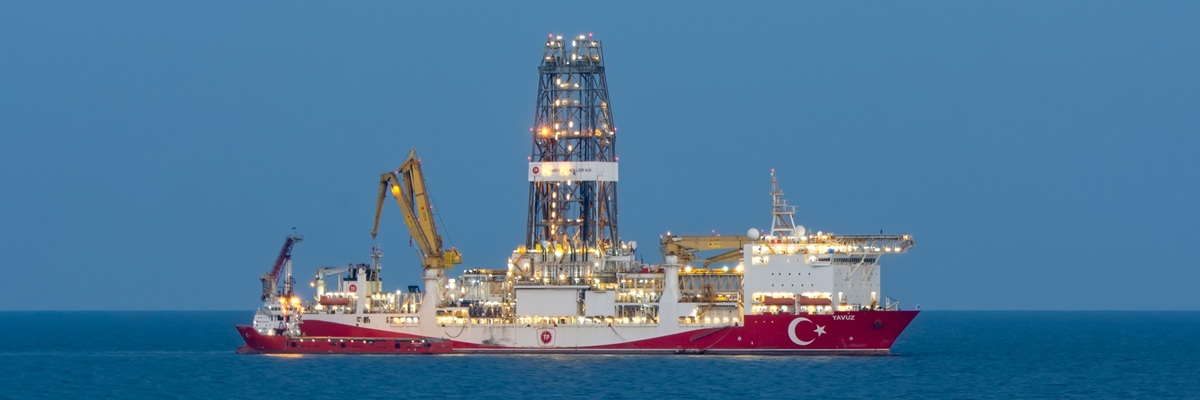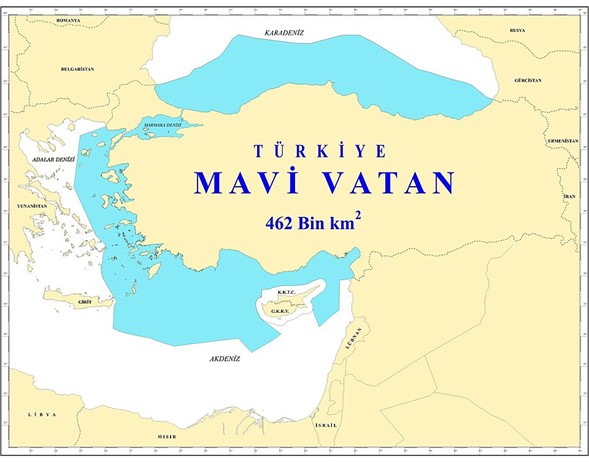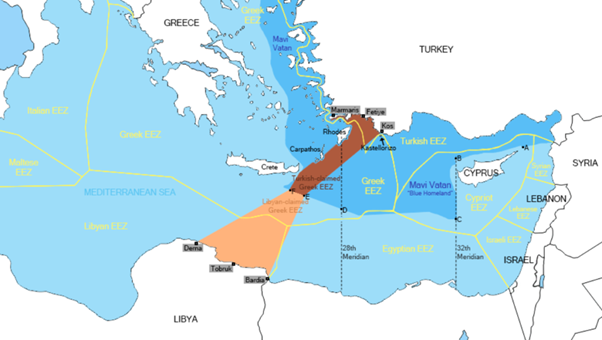Defense & Security
Mavi Vatan: The turkish strategy for Resources in the Eastern Mediterranean Sea

Image Source : Shutterstock
Subscribe to our weekly newsletters for free
If you want to subscribe to World & New World Newsletter, please enter
your e-mail
Defense & Security

Image Source : Shutterstock
First Published in: Sep.29,2025
Sep.29, 2025
In February 2019, the Turkish Naval Force carried out a large-scale military exercise in the Aegean Sea, the Black Sea, and the Eastern Mediterranean Sea to test the operation of the new weapons and naval systems acquired by the country over the last decade. At first, this event did not generate adverse reactions from the international community, but six months later alarm bells rang when, during a speech by President Recep Tayyip Erdoğan at Turkey’s National Defense University, a map was publicly displayed showing what the Republic of Turkey considered to be its sovereign maritime domains. This later became associated with a concept known as Mavi Vatan.
Proposed by Admiral Cihat Yaycı and developed by Admiral Cem Gürdeniz, Mavi Vatan or the Blue Homeland Doctrine is a project and geostrategic representation of Turkey with the intention of claiming the state’s supposed jurisdiction over parts of the Eastern Mediterranean and the Aegean Sea. It demonstrates Turkey’s dissatisfaction with the limits established by international law—the United Nations Convention on the Law of the Sea (1982)—and upholds its right to the legitimate defense of sovereignty over what it asserts are its maritime domains: 462,000 km² comprising its territorial waters, its Exclusive Economic Zone (EEZ), and its continental shelf (Denizeau, A., 2021).

Figure 1: Map of ‘Mavi Vatan’ or the Blue Homeland Doctrine publicly displayed during President Erdoğan’s speech at Turkey’s National Defense University (August 2019). Source: Wikimedia Commons
‘Mavi Vatan’ not only represents a historical claim regarding the events of 2004, when the Republic of Cyprus became an official member of the European Union and established its own maritime borders as a state, which, under the framework of international law, pushed the Republic of Turkey into a narrow strip of sea in which to operate. At the same time, Mavi Vatan emerged as a solution to the growing security challenges that have arisen in the last decade of the 21st century, challenges that have threatened not only the integrity of the state itself but also all those elements that guarantee its survival in the international arena; in this case, Turkey’s access to energy resources.
With projections that the Republic of Turkey will reach 90 million inhabitants by 2030 (Martín, L; n.d.), the Turkish state is aware of the increasing energy demands needed to adequately meet the needs of a rapidly growing population. To satisfy that demand, it is compelled to seek optimal sources of income to achieve this purpose. In response—and knowing of the large hydrocarbon reserves discovered in the Eastern Mediterranean Sea in recent years (Zeballos Rivero, M., 2024)—Turkey has turned to Mavi Vatan as a solution. If successfully implemented, it would allow Turkey to establish an area for the exploration and exploitation of resources lying beneath these waters to cover its urgent energy needs.
The problem? Turkey is not the only interested party. Countries such as Israel, Lebanon, and Egypt, sharing coastlines with the Eastern Mediterranean Sea, are also engaged in heated disputes over legitimate access to these energy resources. However, the most pressing rivalry remains between Turkey and Cyprus, who, having relatively greater capacities to extract energy resources, have been at the forefront of an active dispute to claim sovereignty over these hydrocarbons.

Figure 2: Map of the EEZs of the Eastern Mediterranean countries and also of Mavi Vatan. Source: Emmanouilidis, C. (2020, August 31). Tensions in the Eastern Mediterranean. European Data Journalist Network. https://www.europeandatajournalism.eu/es/cp_data_news/tensiones-en-el-mediterraneo-oriental/
On the one hand, there is the Cyprus–Egypt–European Union alliance, which has agreed upon and mutually recognized the maritime boundaries corresponding to each of them in the Eastern Mediterranean Sea, while clearly omitting the possible sovereignty claims of other countries in the disputed area (s.autor, 2024). On the other hand, there are Turkey’s individual efforts, which, in its quest to gain access to hydrocarbon resources in the sea in question, signed a Memorandum of Understanding in November 2019 with Libya’s Government of National Accord (GNA) to establish an EEZ stretching from Turkey’s southern coast to the northwestern area of the North African country. This agreement granted the Turks rights to hydrocarbon exploration and exploitation in the zone (s.autor, 2024). Although the agreement was suspended in 2021, Turkey has continued to promote ongoing exploration expeditions in the region, which have even extended to Somali waters, with whom it already has agreements in this field.
The firm actions taken by states in the region demonstrate that, beyond being an ambition for access to energy resources in the Eastern Mediterranean, the dispute actually represents an active risk to stability and security in the region. Firstly, from the energy dimension: given the importance of energy resources for human development, the continuation of hostilities among the involved states prevents the establishment of cooperative mechanisms that would allow all parties to benefit from the issue. Instead, it risks generating a zero-sum game in which only the strongest state would emerge victorious while the others remain vulnerable to an imminent energy crisis, thereby putting thousands of human lives at risk.
Secondly, from the military dimension, there is the latent possibility that an armed conflict could erupt at any moment in the Eastern Mediterranean over immediate access to the contested resources. Without underestimating the military capabilities of the other countries involved, it is important to highlight the case of Turkey, which in recent years has significantly expanded its military capacities as part of the reformulation of its Foreign Policy. This has allowed Turkey to position itself as the ninth-strongest military power in the world (Global Fire Power, 2025) and the second-largest army within the North Atlantic Treaty Organization (NATO).
On the opposite side lies Cyprus, which, although it does not possess the same military capabilities as the Republic of Turkey, does benefit from the direct support of the European Union, which, if necessary, could easily respond to potential acts of aggression in a military conflict in the region. Both sides of the dispute—Turkey and the European Union along with Cyprus—truly have sufficient resources to escalate the conflict if they so desire, but they have not done so for reasons that remain unclear.
For now, the situation remains uncertain. Beyond warnings or complaints from some states and/or international organizations, there has been no decisive action to put an immediate end to the conflict, since, in reality, no large-scale crisis has yet warranted such a response. However, it is important not to underestimate the phenomenon: the fact that it has not yet generated a major impact does not mean it could not do so one day, especially considering the great capacities the involved states have both to act and to respond to possible aggression.
Historically, disputes over energy resources have generated unprecedented wars that have cost thousands of lives—for example, the Gulf War in 1991. It is therefore necessary to continue monitoring such situations to prevent them from escalating into conflicts as violent as those of the past. Thus, diplomatic channels between all parties to the conflict must be pursued, with the aim of generating cooperative solutions that foster peace and prosperity among nations, rather than new problems.
References
Denizeau, A. (abril, 2021) “Mavi Vatan, the ‘Blue Homeland’: The Origins, Influences and Limits of an Ambitious Doctrine for Turkey”, Études de l’Ifri, Ifri.
E. (2019, 30 diciembre) La lucha por los recursos en el Mediterráneo Oriental. Anadolu Ajansi. https://www.aa.com.tr/es/mundo/la-lucha-por-los-recursos-en-el-mediterr%C3%A1neo-oriental-/1685950
Global Fire Power (2025). 2025 Military Strength Ranking. https://www.globalfirepower.com/countries-listing.php
Jager, J.; Norris, A. (2021, 27 septiembre). The Mavi Vatan Doctrine and Blue Homeland Anthem: A Look At Turkey’s Maritime Worldview. Center for International Maritime Security. https://cimsec.org/the-mavi-vatan-doctrine-and-blue-homeland-anthem-a-look-at-turkeys-maritime-worldview/
Kaya Ulger, I. (2020, 14 octubre) Turquía continúa defendiendo su “patria azul”. Anadolu Ajansi. https://www.aa.com.tr/es/mundo/turqu%C3%ADa-contin%C3%BAa-defendiendo-su-patria-azul-/2005458
Mason, S. (2020, 20 septiembre). Blue Homeland: The Heated Politics Behind Turkey’s New Maritime Strategy - War on the Rocks. War On The Rocks. https://warontherocks.com/2020/06/blue-homeland-the-heated-politics-behind-turkeys-new-maritime-strategy/
Martín, L. (s. f.). ‘Mavi Vatam’: la doctrina turca de la ‘patria azul‘. Global Affairs and Strategic Studies. https://www.unav.edu/web/global-affairs/detalle/-/blogs/-mavi-vatam-la-doctrina-turca-de-la-patria-azul-3
Menjón, D. M. (2021, 7 octubre). Dossier Geopolítico Especial: Teoría de la “Patria Azul”. Turquía se proyecta sobre el mar (de la energía). Hermes Kalamos. https://www.hermes-kalamos.eu/dossier-geopolitico-especial-teoria-de-la-patria-azul-turquia-se-proyecta-sobre-el-mar-de-la-energia/
S. a. (2024, 10 abril) Cihat Yayci: Libia es un socio estratégico y un aliado para proteger y promover la seguridad de Turquía. OtraLecturA https://otralectura.com/2024/03/15/cihat-yayci-libia-es-un-socio-estrategico-y-un-aliado-para-proteger-y-promover-la-seguridad-de-turquia/
S.a. (s. f.). Mavi Vatan-2019 Tatbikatının Ardından Enerji-Politik Ağırlıklı Bir Değerlendirme. Euronewsport İş dünyasından haberler. https://euronewsport.com/mavi-vatan-2019-tatbikatinin-ardindan-enerji-politik-agirlikli-bir-degerlendirme/
Zeballos Rivero, M. (2023, 22 marzo). Creciente tensión entre Turquía y Grecia por reservas de gas en el Mediterráneo. Global Affairs And Strategic Studies. https://www.unav.edu/web/global-affairs/creciente-tension-entre-turquia-y-grecia-por-reservas-de-gas-en-el-mediterraneo
First published in :
World & New World Journal

Jessica Martínez Pluma, graduate of the International Relations program at the National Autonomous University of Mexico (UNAM), Faculty of Political and Social Sciences (FCPyS). Specialized in International Security and Contemporary Issues of the Middle East
Unlock articles by signing up or logging in.
Become a member for unrestricted reading!